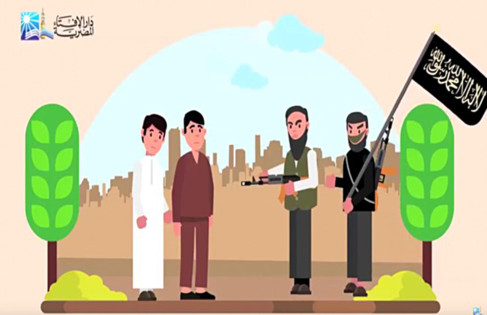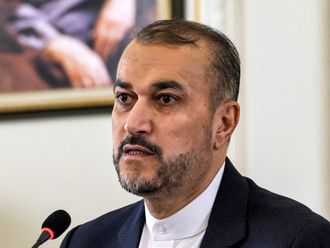
Cairo: Two terrorists ride on a motorbike as a big ball of fire rises in the background as a result of a terror attack. They race off with one of them carrying the black banner of the Daesh terrorist group.
The scene is part of a short animated video recently released by Egypt’s leading Islamic body, Dar Al Ifta, marking the latest effort to support the country’s vigorous campaign against religious radicalism.
In recent weeks, the influential institution, which is in in charge of issuing fataws (binding religious edicts) in Egypt, has released a string of videos produced by its newly created graphics unit designed to help debunk fallacies propagated by militant groups.
The videos, each hardly two minutes in duration, presents rulings derived from Islam’s Holy Quran and sayings of Prophet Mohammad (peace be upon him)-- Islam’s two main sources of jurisprudence. Themes include warnings against sheltering terrorists and roots of present-day radical groups including Daesh, Al Qaida and Nigeria’s Boko Haram.
The latest video, released earlier this month, admonishes against false news and rumours, a main concern in Egypt.
Starts with a vurse from the Quran saying “O ye who believe! If a wicked person comes to you with any news, ascertain the truth, lest ye harm people unwittingly and afterwards become full of repentance for what ye have done.”
Going further calling on people to abide by the Prophet (peace upon him) commands anyone who testifies to make his words and testimony as clear as his viewing of the sun. The Prophet also admonished in his sayings against gossip. Listening to rumours and false news as well as spreading them is unbecoming of the wise people, and alien to Muslims’ morals. Rumours threaten societies, people’s lives and nations’ future.
Beware of misleading rumours and lies propagated by terrorists and militants who want to strike at our societies and carry out their plots. The Muslim safeguards his nation and society. Avoid being a mouthpiece of lies and rumours. You must know that preserving the home country belongs to faith.
Other videos in the pipeline are aimed at refuting radical ideas about concepts of jihad, the caliphate and apostasy, according to officials in Dar Al Ifta.
“The graphics unit comes in response to recommendations of a conference held in Cairo last October under auspices of President Abdul Fattah Al Sissi on the role of Ifta institutions in the world,” Ebrahim Nejm, an advisor to Egypt’s chief Islamic authority, the Grand Mufti, said.
He explained that the conference recommended innovating “attractive and effective” tools to counter expansion of violent militancy.
“The graphics unit is tasked with produced animated cartoons presenting short replies to preachers of extremism and terrorism, by using advanced technology in order to reach society’s categories, mainly the youth, and counter the misleading propaganda of the extremist groups,” Nejm added in a press statement.
Egypt has pursued a relentless crackdown on militants in the country since the army’s 2013 overthrow of Islamist president Mohammad Mursi following mass protests against his rule.
Post-Mursi Egypt has seen a spate of militant attacks mainly targeting security forces and the minority Christians.
Since taking office in 2014, Al Sissi has repeatedly urged Muslim scholars to reform religious teachings and highlight Islam’s moderate tenets in order to back up the country’s anti-militancy efforts.
Since Mursi’s overthrow, Egyptian authorities have tightened their grip on mosques across the country, denying his now-banned Muslim Brotherhood and allies a main forum to influence devout Muslims. The clampdown has also resulted in removing books promoting radicalism from mosques.
In 2014, Dra Al Ifta launched the “Observatory of Radical Fatwas”, a platform aimed at publishing in-depth studies exposing religious misconceptions propagated by militants.
Last year, religious authorities set up booths at Cairo subway’s main station with a view to explaining Islamic rulings to commuters for free about different life issues.
Some experts have hailed the variety of endeavours.
“Lack of access to authentic sources on religion as well as high rates of illiteracy have helped in the spread of extremist ideas,” said MP Amna Nouseir, who is also a professor of Islamic faith and philosophy at Al Azhar University. Around 25.8 per cent of Egypt’s population of nearly 100 million are illiterate, according to 2017 official statistics.
“It is necessary to use a simple language and tools to unmask these ideas, which are alien to Islam,” Nuseir told Gulf News.
“Terrorist groups took advantage of long negligence of spreading and emphasising Islam’s moderation,” she said. “Therefore, there is a need to intensify and diversify efforts to confront their sinister thinking.”












